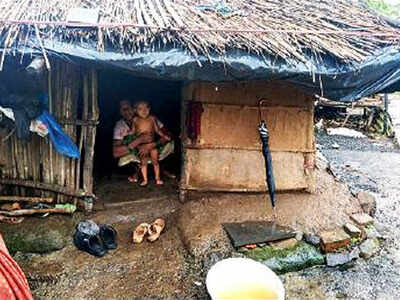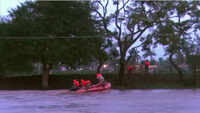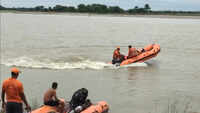
THANE: Shevantibai Mukne is carefully hopping over broken furniture, sharp glass shards scattered all over the wet floor and soiled toys, which once decorated her modest home in Jugaon, a village ravaged by overflowing water from Bhatsa dam.
A few metres away, Valkibai Jadhav had a tough day sweeping out mud and slush that swept into her home on Sunday when floodwater gushed in, sparing not a single house in Jugaon, barely two km away from Bhatsa lake.
The 16 families in Jugaon who had never before experienced the fury of floods, realised that the situation had got out of hand when water levels rose over eight feet in a matter of hours, forcing all 58 residents to take shelter on the rooftop of a house.
It was the presence of mind of few that saved them all. A local, Kailash Palvi, made an SOS call to the district administration. "The water levels were going up swiftly from Friday. In normal circumstances, the water recedes after two days, but when we saw that even after two days there was no let-up in the rain, we realised the risk of staying there, I immediately started contacting for help. We then took all the villagers to a place which was on higher ground and waited there for help. To signal to IAF, we used some tyres lying around; we tried to light them up to alert the authorities," said Kailash Palvi.
IAF had sent a helicopter to evacuate the villagers to Thane, where Shiv Sena corporator Sanjay Bhoir made arrangements for their stay and shelter for the next few days in Balkum.
Returning home on Tuesday, the villagers were shocked to see the path to their village blocked with slush and stones from the river bed. The narrow concrete bridge over the Bhatsa lake connecting to their village is crumbling and their homes battered.
Kitchen utensils have been washed away, their livestock wiped out and walls of their houses damaged. Power supply has been snapped as the electric poles lie uprooted; the area stinks of slush.
Kalyan tehsildar Deepak Akade who visited Jugaon on Wednesday had brought cooked food with him to feed the locals.
All the family heads are now worried about the days that lie ahead. The daily wage workers among them have no food stocks, while those who survive on income from farms or livestock are counting their losses.
A few metres away, Valkibai Jadhav had a tough day sweeping out mud and slush that swept into her home on Sunday when floodwater gushed in, sparing not a single house in Jugaon, barely two km away from Bhatsa lake.
The 16 families in Jugaon who had never before experienced the fury of floods, realised that the situation had got out of hand when water levels rose over eight feet in a matter of hours, forcing all 58 residents to take shelter on the rooftop of a house.
It was the presence of mind of few that saved them all. A local, Kailash Palvi, made an SOS call to the district administration. "The water levels were going up swiftly from Friday. In normal circumstances, the water recedes after two days, but when we saw that even after two days there was no let-up in the rain, we realised the risk of staying there, I immediately started contacting for help. We then took all the villagers to a place which was on higher ground and waited there for help. To signal to IAF, we used some tyres lying around; we tried to light them up to alert the authorities," said Kailash Palvi.
IAF had sent a helicopter to evacuate the villagers to Thane, where Shiv Sena corporator Sanjay Bhoir made arrangements for their stay and shelter for the next few days in Balkum.
Returning home on Tuesday, the villagers were shocked to see the path to their village blocked with slush and stones from the river bed. The narrow concrete bridge over the Bhatsa lake connecting to their village is crumbling and their homes battered.
Kitchen utensils have been washed away, their livestock wiped out and walls of their houses damaged. Power supply has been snapped as the electric poles lie uprooted; the area stinks of slush.
Kalyan tehsildar Deepak Akade who visited Jugaon on Wednesday had brought cooked food with him to feed the locals.
All the family heads are now worried about the days that lie ahead. The daily wage workers among them have no food stocks, while those who survive on income from farms or livestock are counting their losses.
Trending Topics
LATEST VIDEOS
More from TOI
Navbharat Times
Featured Today in Travel
Quick Links
Lok Sabha Election Schedule 2019Lok Sabha Election NewsDelhi Capitals teamMI team 2019Rajasthan Royals 2019RCB team 2019Maharashtra Lok Sabha ConstituenciesBJP Candidate ListBJP List 2019 TamilnaduShiv Sena List 2019AP BJP List 2019Mamata BanerjeeBJP List 2019 MaharashtraPriyanka GandhiBJP List 2019 KarnatakaAMMK Candidate List 2019BJP List 2019 WBLok Sabha Elections in Tamil NaduBSP List 2019 UPNews in TamilLok Sabha Poll 2019Satta Matka 2018PM ModiMahagathbandhanNagpur BJP Candidate ListChandrababu NaiduTamil Nadu ElectionsUrmila MatondkarNews in TeluguMadras High CourtTejashwi YadavArvind KejriwalTejasvi SuryaPawan KalyanArvind KejriwalYogi AdityanathJaya PradaSatta King 2019Srinagar encounter
Get the app







